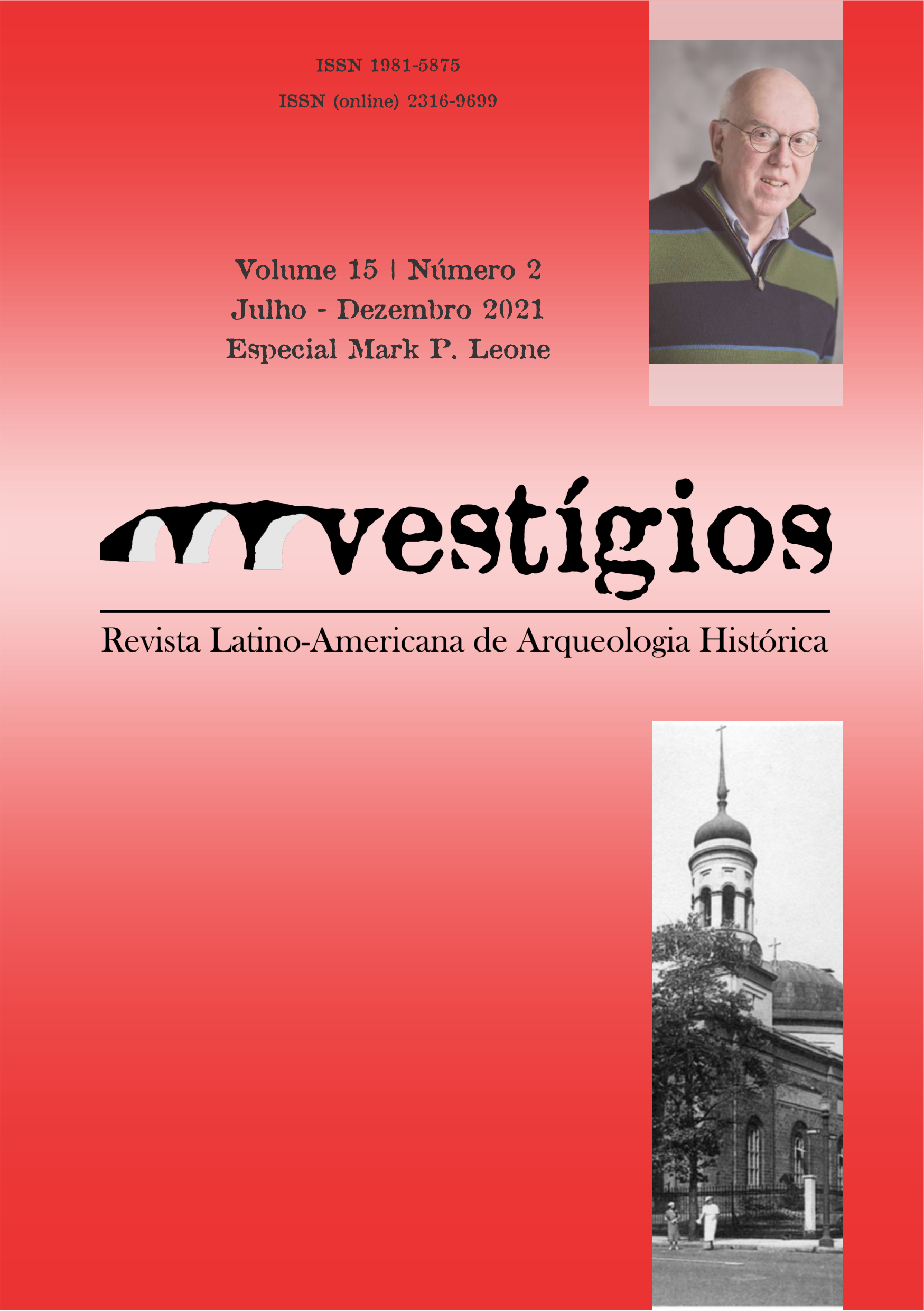Pode a Arqueologia Histórica Afro-Americana ser uma voz alternativa?
DOI:
https://doi.org/10.31239/vtg.v15i2.35405Palavras-chave:
Arqueologia Histórica, Arqueologia Afro-AmericanaResumo
Partindo de uma visão da Arqueologia Histórica como forma alternativa de construção dos passados dos grupos subalternos, este artigo se propõe a situar uma linha de estudos arqueológicos da História afro-americana. É a partir desse tipo de estudos críticos que a disciplina contribui para a construção de uma sociedade mais plural e democrática.
Referências
Althusser, L. (1971). Ideology and ideological state apparatuses. In Lenin and Philosophy. New York: Monthly Review Press.
Beaudry, M. (1990). Review of Leone and Potter (1988) The Recovery of Meaning in the Eastern United States. Historical Archaeology, 24(3), p. 115–118.
Beaudry, M., Cook, L., & Mrozowski, S. (1991). Artifacts and active voices: material culture as social discourse. In McGuire, R. & Paynter, R. (Eds.) The Archaeology of Inequality (p. 150–191). Cambridge: Basil Blackwell.
Brown, M. (1992). The archaeology of Virginia’s Golden Age: new insights and future directions. Trabajo presentado en Council of Virginia Archaeologists Symposium VI. Charlottesville, 22–23 de Mayo de 1992.
Habermas, J. (1976). Legitimation Crisis. Trad. T. McCarthy. London: Heinemann.
Habermas, J. (1984). The Theory of Communicative Action, Vol. 1, Reason and the Rationalization of Society. Boston: Beacon Press.
Habermas, J. (1989). The Theory of Communicative Action, Vol. 2, System and Lifeworld. Boston, Mass.: Beacon Press.
Hodder, I. (1986). Reading the Past; Current Approaches to Interpretation in Archaeology. Cambridge: Cambridge University Press.
Hodder, I. (1991). Interpretive archaeology and its role. American Antiquity, 56, p. 7–18.
Kaiser, H. J. (s/f). Oral history interviews with former residents of Franklin Street and Gott’s Court, Annapolis, Maryland. Manuscrito en archivo en Banneker-Douglass Museum, Annapolis.
Leone, M., & Potter, P. (1992). Legitimation and the classification of archaeological sites. American Antiquity, 57(1), p. 137–145.
Logan, G. (1990). Project Director Evaluation for Maryland Humanities Council Grant #032-L, Historical archaeology and African American heritage in Annapolis: A program of public interpretation for the community.
Logan, G. (1991). Project Director Evaluation for Maryland Humanities Council Grant #729-M, The Maryland Black experience as understood through archaeology.
McWilliams, J. (1991). Historical title search and documentation: 163 Duke of Gloucester Street report. Informe preparado para Port of Annapolis, Inc., February 1991.
Mullins, P., & Warner, M. (s/f). Archaeological excavations at the Maynard-Burgess site, 18AP64. Informe en preparación.
Potter, P., & Leone, M. (1987). Archaeology in public in Annapolis: four seasons, six sites, seven tours and 32.000 visitors. American Archaeology, 6(1), p. 51–61.
Purser, M. (1992). Oral history and historical archaeology. In Little, B. (Ed.) Text-Aided Archaeology (p. 25–35). Boca Raton: CRC Press.
Reitz, E. J. (1987). Preliminary analysis of vertebrate remains from features 5 and 121, at the Calvert House, Annapolis, Maryland. Informe en archivo en Historic Annapolis Foundation.
Schulz, P., Rivers, B., Hales, M., Litzinger, C., & McKeen, E. (1980). The Bottles of Old Sacramento: A Study of Nineteenth-Century Glass and Ceramic Retail Containers, Parte I. California Archaeological Reports No. 20. Department of Parks and Recreation, State of California.
Shackel, P. (1986). Archaeological testing at the 193 Main Street site, 18AP44, Annapolis, Maryland. Informe en archivo en Archaeology Laboratory, Department of Anthropology, University of Maryland, College Park.
Shanks, M. & Tilley, C. (1987). Re-Constructing Archaeology. Cambridge: Cambridge University Press.
Warner, M. (1991). African American Annapolitans: social dominance and material negotiation. Trabajo presentado en Conference on Historical and Underwater Archaeology, 9–13 Enero, Richmond.
Warner, M. (1992a). African Americans in nineteenth-century Annapolis: material consumption and the negotiation of identities. Trabajo presentado en 57th Annual Meeting of the Society for American Archaeology, 8–12 Abril, Pittsburgh.
Warner, M. (1992b). Test excavations at Gott’s Court Annapolis, Maryland 18AP52. Informe en archivo en Archaeology Laboratory, Department of Anthropology, University of Maryland, College Park.
Yentsch, A. (1991). Access and space, symbolic and material, in historical archaeology. In Walde, D. & Willows, N. (Eds.) The Archaeology of Gender: Proceedings of the Twenty-Second Annual Conference of the Archaeological Association of the University of Calgary (p. 252–262). Calgary: The University of Calgary Archaeological Association.
Downloads
Publicado
Edição
Seção
Licença
Copyright (c) 2021 Mark P. Leone, Paul R. Mullins, Marian C. Creveling, Laurence Hurst, Barbara Jackson-Nash, Lynn D. Jones, Hannah Jopling Kaiser, George C. Logan, Mark S. Warner; Melisa A. Salerno

Este trabalho está licenciado sob uma licença Creative Commons Attribution-NonCommercial 4.0 International License.

O trabalho Vestígios - Revista Latino-Americana de Arqueologia Histórica de https://periodicos.ufmg.br/index.php/vestigios/index está licenciado com uma Licença Creative Commons - Atribuição-NãoComercial 4.0 Internacional.
Baseado no trabalho disponível em https://periodicos.ufmg.br/index.php/vestigios/index.
Podem estar disponíveis autorizações adicionais às concedidas no âmbito desta licença em https://periodicos.ufmg.br/index.php/vestigios/index.


